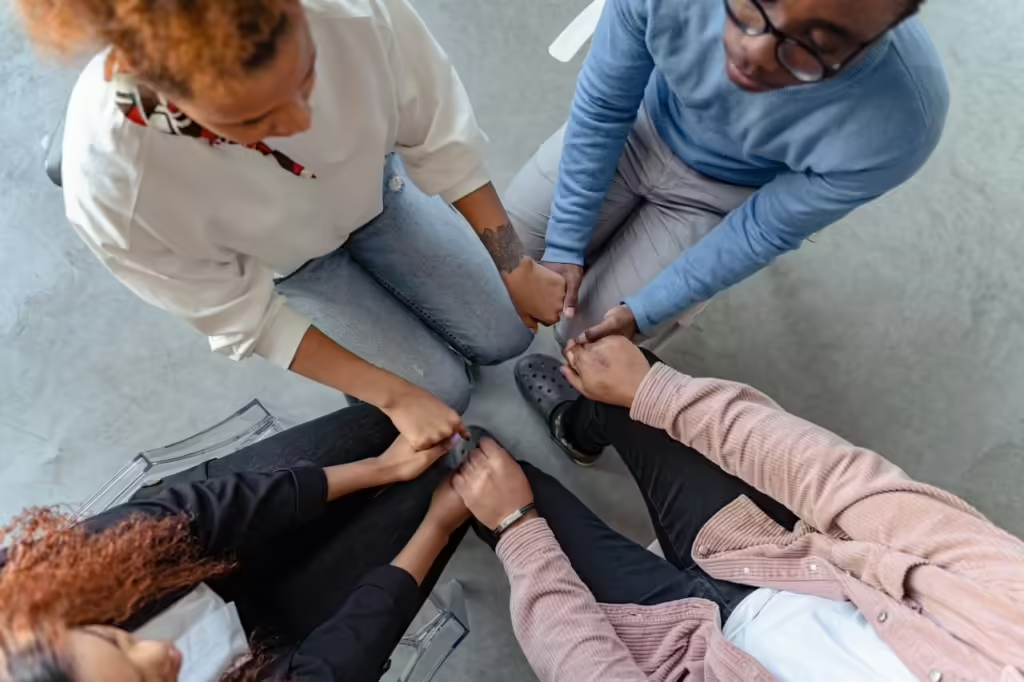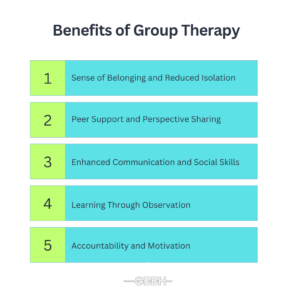Mental health challenges can feel overwhelming, but no one needs to face them alone. Group therapy is an essential form of mental health treatment that allows individuals to support each other in a safe, structured setting. With the guidance of a trained therapist, participants share experiences, learn coping strategies, and grow together. In this blog post, we’ll explore what group therapy is, how it works, and why it plays a crucial role in mental health programs.
What Is Group Therapy?
Group therapy is a type of therapy where multiple individuals with similar mental health issues come together to work towards common goals. Sessions are led by a therapist who specializes in group dynamics and mental health treatment. The group environment fosters shared learning, mutual support, and a sense of community among participants.
This form of therapy is commonly used in mental health treatment centers in Massachusetts and around the world. It’s a complementary approach, often integrated with other treatments like individual therapy or medication. Group therapy sessions provide a space where individuals can safely express their feelings, share personal stories, and learn from others in a similar situation.
How Does Group Therapy Work?
Group therapy follows a structured format, ensuring that everyone benefits from the experience. Here’s a typical breakdown of how sessions usually flow:
- Opening and Introductions
At the start of each session, the therapist welcomes everyone and encourages brief introductions. For new members, this is a crucial step in building trust and comfort within the group. - Guided Discussion
After the introductions, the therapist may introduce a theme or specific topic related to the group’s needs, such as managing anxiety, improving communication, or coping with trauma. Participants are invited to share their thoughts, feelings, and personal experiences in relation to the topic. - Interactive Exercises or Skill Development
In some sessions, the therapist may introduce interactive activities, like role-playing or mindfulness exercises. When using cognitive-behavioral therapy (CBT), participants might work on challenging negative thought patterns or learning more positive coping strategies. Dialectical behavior therapy (DBT) is also frequently used, focusing on emotional regulation and interpersonal effectiveness. - Feedback and Reflection
As the session winds down, group members are often encouraged to reflect on what they’ve learned. This allows individuals to provide feedback and discuss how they plan to apply new skills in their everyday lives.
Group therapy can last anywhere from 60 to 90 minutes, and groups typically meet weekly. Depending on the participants’ needs, some groups are ongoing, while others are time-limited, lasting for a set number of weeks.
Common Therapeutic Approaches in Group Therapy
Various therapeutic models are used in group therapy depending on the participants’ needs. Some common approaches include:
1. Dialectical behavior therapy (DBT)
Dialectical behavior therapy is another approach often used in group therapy. DBT is particularly effective for individuals dealing with intense emotions, such as those with borderline personality disorder. The group setting allows participants to practice emotional regulation and distress tolerance while receiving support from others who face similar challenges.
2. Supportive Group Therapy
In this more relaxed form of group therapy program, the emphasis is on mutual support. The therapist facilitates discussion, but the focus is on participants sharing their experiences and offering encouragement to one another. This type of therapy is often used alongside other more structured therapeutic approaches.
Benefits of Group Therapy
Group therapy provides several unique benefits that make it an important part of comprehensive mental health treatment.
1. Sense of Belonging and Reduced Isolation
Many people struggling with mental health issues feel isolated, as if they’re alone in their experiences. Group therapy helps break down this isolation by bringing people with similar challenges together, creating a strong sense of community and belonging. Seeing others face and work through similar challenges can be incredibly comforting and affirming.
2. Peer Support and Perspective Sharing
In a group setting, members can offer insights, share personal coping strategies, and provide emotional support to one another. This peer feedback is invaluable as it introduces participants to a range of perspectives and solutions they might not have considered. This collective support can often make therapy feel more dynamic and engaging.
3. Enhanced Communication and Social Skills
Group therapy provides a safe space to practice communication and interpersonal skills, especially for individuals who struggle with social anxiety, assertiveness, or self-expression. By interacting regularly with others, participants build stronger social skills, increase self-confidence, and improve their ability to articulate feelings.
4. Learning Through Observation
Observing others as they process emotions, face fears, and work on coping skills can serve as a model for personal growth. Group members often learn by watching how others handle challenges or implement the therapeutic skills they’re learning, which can reinforce their own progress.
5. Accountability and Motivation
Group therapy provides an accountability system that can motivate participants to stay committed to their goals. Knowing that others are aware of their progress often encourages participants to stay engaged, complete therapeutic exercises, and actively participate. Members celebrate each other’s successes, which creates a positive feedback loop.
Is Group Therapy Right for You?
Group therapy can be an effective form of treatment for many, but it’s important to assess if it’s the right fit for you. If you are open to sharing your thoughts and experiences in a group setting and feel comfortable engaging with others, group therapy can be a fantastic option. For those who prefer privacy or are not yet ready to open up to others, individual therapy might be a better initial step.
If you are considering group therapy, it’s helpful to consult with a therapist or counselor at a mental health treatment center in Massachusetts to discuss your needs and determine if it aligns with your treatment goals.
Types of Group Therapy
There are several types of group therapy, each designed to address specific issues or needs. The following are some common types:
- Cognitive-Behavioral Therapy (CBT) Groups: These groups focus on identifying and challenging harmful thoughts and behaviors. Participants learn techniques to manage symptoms of anxiety, depression, and stress, such as thought-stopping and behavioral activation.
- Dialectical Behavior Therapy (DBT) Groups: DBT groups help participants develop skills to handle emotional regulation, distress tolerance, and interpersonal effectiveness. These are especially helpful for people dealing with mood disorders and borderline personality disorder.
- Support Groups: Often peer-led, these groups focus on providing a safe space for members to share personal experiences and challenges. Topics can include grief, addiction recovery, and chronic illness, providing emotional support and a sense of belonging.
- Psychoeducational Groups: These groups are focused on teaching specific skills or knowledge related to mental health. Participants might learn about managing symptoms, building healthier routines, or understanding mental health disorders.
When Is Group Therapy Most Beneficial?
Group therapy can be particularly beneficial for individuals dealing with:
- Anxiety and Depression: Participating in a group helps members share their experiences and learn ways to manage symptoms through guided exercises.
- Interpersonal Difficulties: People struggling with relationship issues can practice communication skills, role-play scenarios, and receive feedback within a supportive setting.
- Trauma Recovery: Group therapy is helpful for trauma survivors, providing a safe environment for sharing experiences, reducing the sense of isolation, and finding comfort among others with similar histories.
- Emotional Dysregulation: DBT-based groups are especially effective for people who struggle with regulating intense emotions, as they focus on mindfulness and emotional management techniques.
The Importance of Seeking Professional Help
If you’re unsure whether group therapy is right for you, consider speaking with a mental health professional who can assess your needs. Group therapy at a Mental Health Treatment Center can be an empowering step toward improved mental health and well-being. Programs may include trauma-focused therapies, EMDR Therapy, and even Group Therapy Programs specifically designed for those managing intense emotions or seeking support through life transitions.
Conclusion
Group therapy is a valuable tool in modern mental health care, providing individuals with the chance to grow, heal, and connect in a supportive environment. Whether through cognitive-behavioral therapy, dialectical behavior therapy, or other approaches, group therapy has proven to be effective in improving emotional well-being and fostering a sense of community.
If you’re considering joining a mental health therapy program, exploring group therapy as part of your treatment plan may offer the support and skills you need to navigate your mental health journey successfully. Call us at (888)278-0716 today to learn more about our services and how we can help you on your journey to recovery!
FAQs on Group Therapy
How does group therapy work?
Sessions are typically structured with an opening, a discussion or exercise, and a closing reflection. Members share experiences, practice therapeutic skills, and receive feedback in a safe, confidential environment.
What types of group therapy are available?
There are several types, including cognitive-behavioral therapy (CBT) groups, dialectical behavior therapy (DBT) groups, support groups, and psychoeducational groups. Each type addresses specific mental health needs and therapeutic goals.
What are the benefits of group therapy?
Group therapy reduces isolation, improves communication, builds coping skills, and provides valuable peer support. It is often more affordable and can serve as a complement to individual therapy.
How do I know if group therapy is right for me?
Group therapy can be particularly helpful for those with anxiety, depression, trauma, or interpersonal issues. If you’re considering group therapy, consult a mental health professional to determine if it aligns with your needs.


